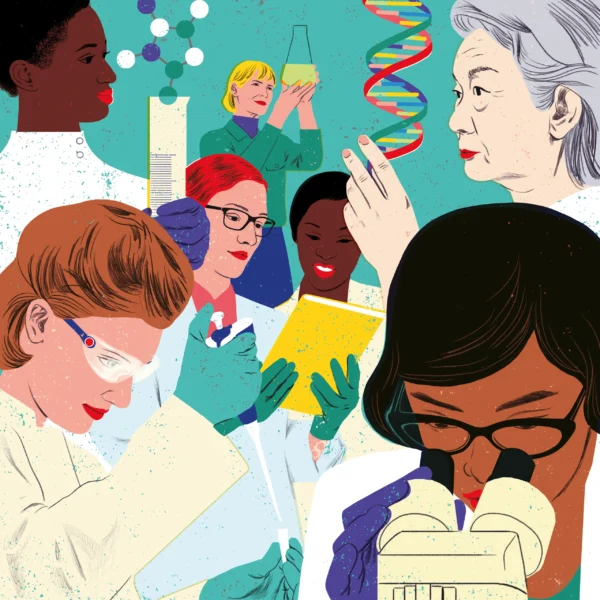
Women in Science: The Rising Field of Biotech Innovations
Women have consistently pushed the boundaries of human knowledge throughout history, playing an essential—yet often overlooked—role in the advancement of science, from Marie Curie’s groundbreaking discoveries to Rosalind Franklin’s pioneering work in uncovering DNA’s structure. Countless women have persevered despite systemic barriers like gender discrimination, limited access to education, and societal expectations. These obstacles lead them to make significant contributions across scientific fields. Their efforts have expanded our understanding of the natural world; they have also paved the way for future generations of women to excel in science, technology, engineering, and mathematics—STEM disciplines.

Recent decades have witnessed an escalating appreciation for the empowerment of women in science. Mentorship programs, scholarships, and campaigns advocating gender diversity within STEM fields are actively dismantling historical barriers. Yet, challenges persist. Underrepresentation of women persists across numerous scientific fields—especially in leadership roles and forefront research areas. This gap highlights the critical need for ongoing advocacy for gender equality in science, ensuring fairness while tapping into the vast array of human talent to address pressing global challenges.
Key Sectors in Biotech Innovations
Drug Development
Drug development—transformative in biotechnology and pivotal for addressing global health challenges—improves our quality of life. Women, instrumental at each stage, from working in cell line development services to spearheading clinical trials, contribute vitally to this field by delivering groundbreaking research and forging lifesaving therapies. Women-led teams have played a crucial role in oncology. They’ve pioneered immunotherapies—treatments that leverage the immune system to combat diseases more effectively. These breakthroughs not only prolong lives but also improve their quality, highlighting diverse perspectives’ significance in scientific progress.
Gene Therapy
Gene therapy marks a frontier in biotechnology. It offers the potential to treat, or even cure, genetic disorders by tackling their underlying causes. Women researchers and entrepreneurs have led the charge, pioneering therapies that modify or replace defective genes to reinstate normal function. For example, teams headed by women stand at the vanguard of creating treatments for rare genetic conditions like spinal muscular atrophy and sickle cell anemia. Once deemed science fiction, these therapies have become reality due to the relentless efforts of women scientists, pioneers who pushed medical boundaries into new possibilities.
Significance of Biotech Innovations
Biotechnology, leading the charge in scientific progress, provides solutions to humanity’s most intricate challenges. It develops life-saving medications, engineers sustainable agricultural practices, and has transformative potential across industries, improving lives worldwide. At its essence, biotech wields biology’s power—creating technologies and products that combat diseases, enhance food security, and mitigate environmental damage. These advancements’ far-reaching implications have transformed the field into a cornerstone of modern science—an essential driver of economic growth.
Women—through groundbreaking research and leadership in initiatives—have fundamentally shaped the biotech sector, revolutionizing healthcare and environmental science. Their role has been pivotal in gene editing, vaccine development, and regenerative medicine. Although they have made considerable contributions, women still find themselves significantly underrepresented within the industry’s top echelons. Fewer hold leadership positions or partake in decision-making roles. Addressing this disparity is not merely a matter of equity but, rather, a strategic imperative: diverse perspectives foster innovation and propel success in complex scientific endeavors.
Biotech innovations command significance that reaches out of the laboratory: they mold public health policies, steer ethical considerations, and sway global economic trends. While the world combats pandemics, climate change, and food insecurity—challenges daunting in their scope—the call for diverse and inclusive biotech leadership resounds more loudly than ever. Amplifying women’s voices in this pivotal field promises an equitable dispersion of biotechnological benefits, It shapes a future built on humanity’s full collective potential.
Future Prospects
The future for women in biotechnology shines brighter than ever. Their contributions garner increasing recognition and the pursuit of gender equity within STEM fields intensifies. Initiatives—mentorship programs, scholarships, leadership training—focus on bridging the gender gap. These create a more welcoming space. Consequently, they empower an emerging cadre of female scientists, researchers, and entrepreneurs who dive into the biotech industry armed with essential tools and resources to thrive. More women shattering barriers translates to the industry reaping benefits from a diverse array of perspectives.
Synthetic biology, personalized medicine, and bioinformatics – these emerging fields offer exciting leadership opportunities for women in transformative research; notably personalized medicine, a revolution in healthcare through treatments tailored to individual genetic profiles. Women scientists contribute significantly here with an expected increase as the field grows. Synthetic biology promises to reshape biological systems for diverse applications—sustainable agriculture, renewable energy included—with an increasing number of women assuming leadership roles, the biotech landscape stands on the cusp of unprecedented advancements.
Achieving true gender parity in biotech necessitates sustained commitment from industry leaders, policymakers, and academic institutions; addressing systemic barriers—such as unequal pay, limited access to funding, and underrepresentation in leadership roles—is crucial for unleashing women’s full potential within the sector. By fostering an environment where women can flourish, the industry promotes equity and ensures that the brightest minds—irrelevant of gender—are poised to tackle our world’s most pressing challenges. Undoubtedly, the talents and determination of women who are only just starting to make their impact felt will shape the future of biotech innovation.
Final Thoughts on Women Driving Biotech Advancement
Women, serving as leaders, innovators, and collaborators—have profoundly and lastingly molded the biotech landscape. Their dynamic roles in cell line development, gene therapy, and drug discovery have propelled scientific advancement while delivering tangible benefits to humanity. This isn’t simply a narrative of individual success; it’s evidence of diversity’s transformative impact on science. Fostering a culture of inclusion and supporting future generations’ aspirations ensures that women will maintain their central role in the evolving biotech industry.
The potential for women to further influence biotechnology is boundless. Emerging technologies and global challenges call for innovative solutions where the contributions of women—bringing unique perspectives, challenging conventional thinking, and prioritizing ethical considerations—are more critical than ever in shaping a future wherein science serves the greater good. Women not only participate in the biotech revolution, they are its architects—their legacy is certain to foster progress for years ahead.













































